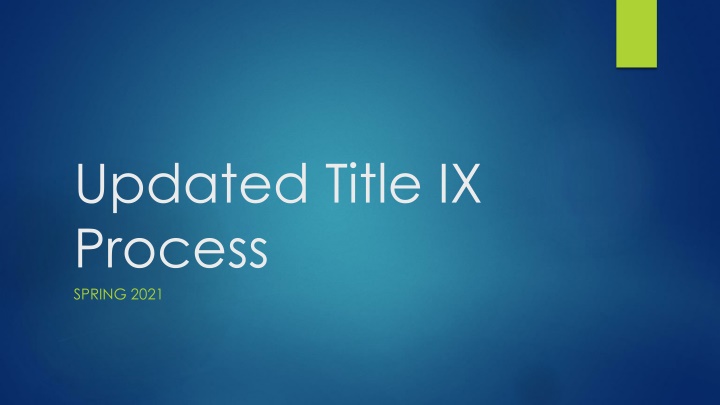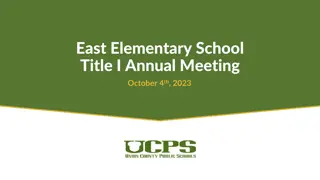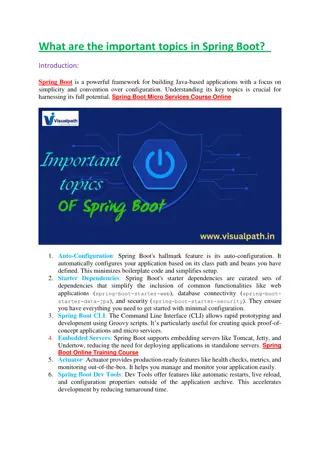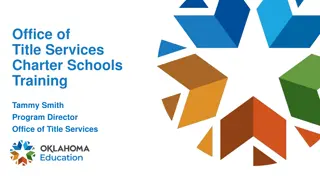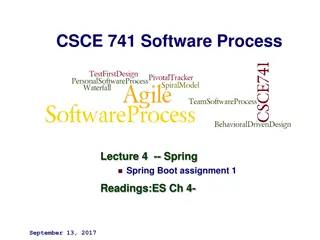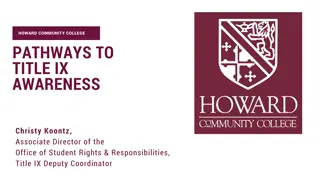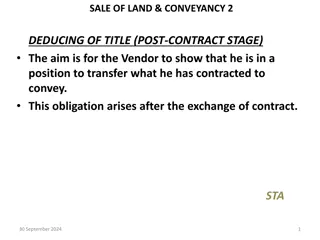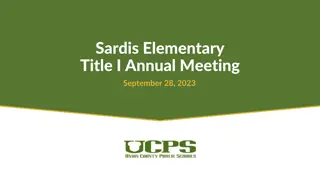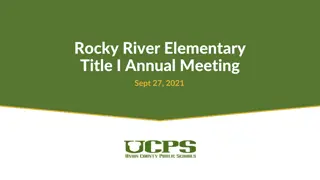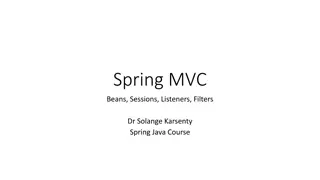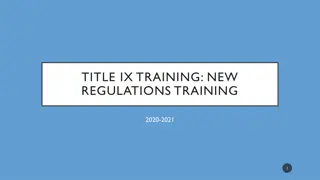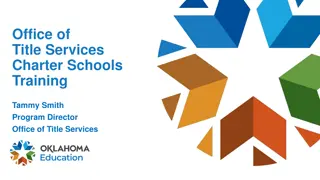Title IX Process Spring 2021 Overview
An overview of the updated Title IX process for Spring 2021, including changes in regulations, policies, procedures, and roles. Details on requirements for formal complaints, access to evidence, investigation reports, hearings, and more.
Download Presentation

Please find below an Image/Link to download the presentation.
The content on the website is provided AS IS for your information and personal use only. It may not be sold, licensed, or shared on other websites without obtaining consent from the author.If you encounter any issues during the download, it is possible that the publisher has removed the file from their server.
You are allowed to download the files provided on this website for personal or commercial use, subject to the condition that they are used lawfully. All files are the property of their respective owners.
The content on the website is provided AS IS for your information and personal use only. It may not be sold, licensed, or shared on other websites without obtaining consent from the author.
E N D
Presentation Transcript
Updated Title IX Process SPRING 2021
Overview of Session Changes to Title IX Roles and Responsibilities In-depth Review of Policies and Procedures Title IX Non-Title IX Next Steps
What has changed? Regulations no longer guidance More narrow, specific definition of what falls under TIX Requires a formal complaint to enact Title IX process Colleges must provide the parties with equal access to inspect and review the evidence
What has changed? Investigator must submit an investigation report summarizing the relevant evidence to decision maker Hearing and live cross examination Very specific rules of evidence and defined procedures Unable to use any statements if a person refuses to be subjected to cross examination
In-depth Review of Policies and Procedures 2.01.19 Prohibition of Sexual Discrimination and Sexual Harassment (Title IX Allegations) 2.01.19.00 Procedure (general) 2.01.19.01 Advisors 2.01.19.02 Grievance 2.01.19.03 Appeal 2.01.01 Prohibition of Sexual Discrimination, Harassment and Interpersonal Misconduct (Non-Title IX Allegations)
Report received by TIX Coordinator or Deputies Pre-Investigation TIX Coordinator evaluates Title IX Coordinator/Deputy Coordinator roles Meet explain options/supportive measures TIX Coordinator: Tracy Morris Deputy Coordinators: Cynthia Vasquez-Barrios Judy Connelly Mary Beth Luna If no formal complaint/does not meet criteria, TIX process ends If formal complaint, process begins
Roles and Responsibilities Title IX Coordinator (8-10 hours of Annual training required 110 ILCS 155/25(b) and 30(c)) Intake of all complaints and initial documentation, including outreach to complainant in accordance with 2.01.19 Gate-keeper function for informal review Communicate/enact interim measures to both parties Determine the need for campus-wide communications/evaluate requests for confidentiality Ensure completion of required training for Title IX team, campus, and students Assignment of Investigators and/or Deputy to cases
Roles and Responsibilities Title IX Coordinator (continued) Monitor timely completion Review findings and make determination Communicate final determinations to both parties and provide information related to appeal process Monitor changes to federal and state law/statute/regulations and communicate changes to Design Team and Investigators as needed Should not investigate cases-only provide oversight
Roles and Responsibilities Title IX Deputies (8-10 hours of Annual training required 110 ILCS 155/25(b) and 30(c)) Serve on Hearing Board not as Chair if not involved in complaint or preliminary review May be an initial intake for a complaint-which will be routed to the Title IX Coordinator for assignment Assist with assignment of investigators/determining interim measures, where needed May provide assistance to investigators during investigation/development of questions ** May conduct investigations in select circumstances**
Roles and Responsibilities Title IX Investigators (8-10 hours of Annual training required 110 ILCS 155/25(b) and 30(c)) Conduct investigations as assigned, individually or in a team Presents information gathered in alignment with Title IX. Does not make assessment on complaint. Present findings and information to the Hearing Board in alignment with Title IX Submit required documentation into Maxient
Roles and Responsibilities Title IX Appellate (Annual training required 110 ILCS 155/25(b) and 30(c)) Satisfies 1 level of appeal best practice Defined in 2.01.19.04 Both parties have the opportunity to appeal to the Appellate-in select situations Should not investigate cases Review policy/procedure change recommendations for approval (with Title IX Coordinator)
Roles and Responsibilities Advisors Both parties are entitled to have an advisor present during any meetings regarding the process. The advisor's function is defined in 2.01.19.01. During meetings and hearings, the advisor may talk quietly with the student or pass notes in a non-disruptive manner. The advisor must ask the cross-examination questions in a Title IX process. The advisor may not, in any way, intervene in the meeting/hearing or address the investigator/ hearing board. The advisor cannot be someone who has a current formal role (e.g., academic advisor, coach, faculty member) with either the respondent or complainant.
Roles and Responsibilities Hearing Officer In Title IX cases, the hearing board will consist of 2 individuals who will work with the Hearing Board Chair. The Chair may be an outside entity with specialized training in the rules of evidence, questioning, etc. Hearing Board members will be present at any hearings to hear and review all evidence. Members will provide input to the Hearing Board Chair, who will ultimately make the decision and recommend the sanctions.
Walk through Policy Definitions Jurisdiction Reporting Processes If it does not meet these thresholds, must dismiss under TIX Dismissal under TIX does not mean the allegations can t be investigated/processed under 2.01.01
Walk through Procedure (general) Supportive measures to both parties non-disciplinary, non-punitive individualized services offered as appropriate, as reasonably available, and without fee or charge designed to restore or preserve equal access for all parties to their educational program or employment without unreasonably burdening the other party and to protect the safety of all parties, and to deter sexual harassment Suspensions are to be used only in limited situations
Walk through Procedure (Advisors) Available to both parties at all meetings Must have an advisor at hearing-advisor must cross- examine May be from JJC or outside of JJC Rules are the same for all advisors/will be given a document at the time advisor is determined Can t speak for the party each party must answer for themselves at all phases of process
Walk through Procedure (Grievance Process) Notifications Timelines Investigation Hearing Live and real-time Can be virtual Hearing Officer rules on each question before answered
Walk through Procedure (Grievance Process) continued Preponderance of the Evidence standard Hearing Board provides input Determination made by Hearing Officer Sanctions (if applicable) determined in conjunction with institutional representative Timelines/Notices
Walk through Procedure (Appeals) Timelines are important An appeal must be based on one or more of the following grounds: 1. A procedural irregularity occurred; 2. New evidence or information exists that could affect the outcome of the matter; 3. The Title IX Coordinator, Investigator or Hearing Officer had a conflict of interest or bias for or against complainants or respondents generally, or the individual Complainant or Respondent, that affected the outcome of the matter; and/or 4. The sanction is disproportionate with the violation.
Next Steps Continued training opportunities (summer/fall) both virtual and on-demand In the case of an allegation, materials and support will be provided Presidential Changes will not have a quick impact
